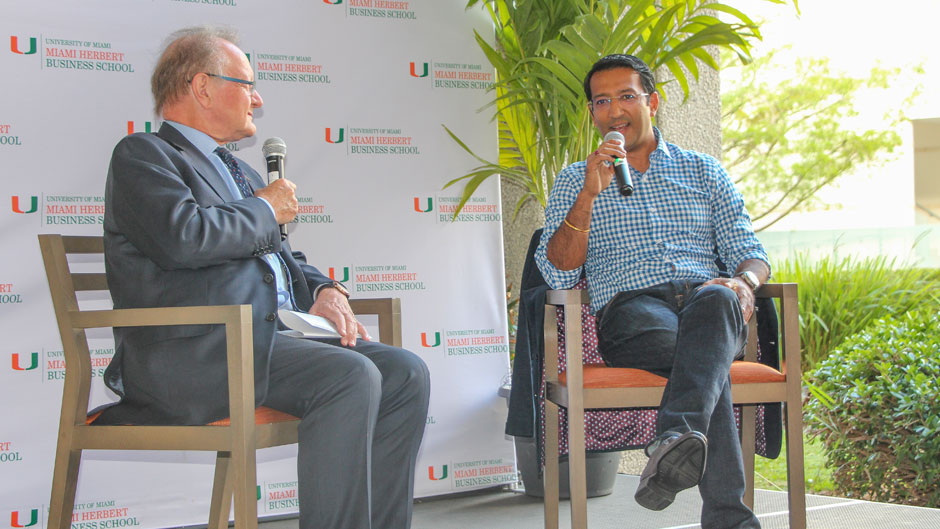Sumit Singh, the leading executive of Chewy since 2018, said that his previous work experience with Dell and Amazon—pioneers of e-commerce—was critical to helping forge the customer-centric business model that has driven the company’s enormous growth, especially during the pandemic.
The CEO spoke with John Quelch, dean of the University of Miami Patti and Allan Herbert Business School, as part of the Southern Glazer's Distinguished Leader Lecture series, held at the Finker-Frenkel Family Promenade.
“Both of these companies were true pioneers of e-commerce and led by visionaries, they encouraged internal mobility and a relentless focus on customer experience and ability to renovate at scale,” Singh explained. “Working there taught me how to be a pioneer and how to take problems that haven’t been solved and solve them really well.”
He held nine different jobs at Dell alone and learned a range of different facets of the operation. As part of his leadership advice, Singh encouraged students to raise their hand often to volunteer for new opportunities.
“Learn from wherever and whoever you can,” he suggested. “There’s power in the ‘build-a-lot, break-a-lot, be-humble, growth mindset,’ and it’s important to have the humility to accept defeat and to persevere. When your boss says do ‘X,’ just say ‘yes’—though if you have a better idea express it—and learn from the experience.”
Chewy was formed in 2011 after the two founders shifted from their original idea of a South Florida-based jewelry startup to one that provided products mainly for dogs and cats. Singh joined as COO in 2017, and six months later the founders bowed out and he became CEO with an intention to create a world class institution, he explained.
During the pandemic revenues increased by $2.2 billion annually, and Chewy currently has some 20 million customers and controls 30 percent of the U.S. pet market, with revenues near $9 billion, according to Singh.
Key to the growth success has been the company’s ability to scale personalization, he said.
“Human beings are really good at creativity, and technology is good at creating scale,” said Singh, explaining that Chewy currently works with about a thousand local artists who hand-draw hundreds of thousands of portraits of customers’ pets.
“We send portraits to our customers, and it’s such a surprise-and-delight moment that they aren’t expecting,” he said. “We kept the customer at the forefront [with the portrait] and we automated everything around it—the upload, the shipping, etc.”
He noted that the company’s mission-purpose statement—"to become the most trusted and convenient destination for pet parents and partners everywhere”—propels constant expansion.
“It takes a village to raise a pet—the shelter, feeding, care, breeder, veterinarian, groomer, there’s a whole community that services pets,” the executive said.
The focus on that wider customer base has prompted the firm to “ladder up” into health care services, including telehealth and pharmacy, to consider internationalizing and to venture deeper into the insurance market. Compared with the UK, Europe, and Australia, where 20 percent of pet owners maintain insurance, only about 2 percent of pet owners in the U.S. have coverage.
Singh, who described himself as “one of the most impatient people I know,” said he was an atypical candidate for a CEO.
“Most CEOs come from the marketing, business, or sales side—I’m a supply chain guy. I ran factories and through my interest in business, I focused on how to take cost out of the system. I want to learn how revenue is generated. The learning agility and putting myself outside of my comfort zone to try new things has been pivotal.”
His professional career has meandered, he said, while encouraging students to follow an “S-curve” in their own development.
“Are you anticipating change and building for change? It’s good to step back and understand where you are on the curve,” he said. “The ideal point for a change is when you’re moving up on the tangent and you can jump over and up onto another curve and not slip back down, which generally happens.”
Based in Dania Beach, Chewy has been an attractive landing point for University students for internships and careers.
What does Singh look for when interviewing students?
“Humility, hard work, intellectual curiosity, and the ability to express an opinion clearly and succinctly,” he responded. “Notice that I didn’t mention grades or what school you attended. There’s no substitute for the value of hard work and curiosity.”
For those who gravitate to leadership positions, Singh recommended the approach of Abraham Lincoln, outlined in the recent book “Team of Rivals.”
“Hire people who share your common values, but those who will disagree with you. It’s important that they think big, act as owners, and debate openly,” he said. “If you are a leader, it’s an obligation that you debate. At some point, you’ll have to make the decision, but encourage the debate.”
Quelch asked what a CEO might learn from their pet.
“Pets make us happy; they bring us together. They’re just this bundle of joy and consistent in the way that they treat you, meet you, and greet you,” Singh said. “What you can learn from them is optimism and positivity, and who doesn’t want an optimistic and a positive world?”

